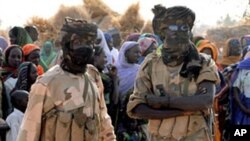Amnesty International warns that the impending withdrawal of U.N. peacekeeping troops from eastern Chad could put the safety of thousands of refugees and other vulnerable populations at risk.
The U.N. Security Council's decision in late May to withdraw some 3,000 U.N. peacekeepers from eastern Chad has sparked concern for the safety of almost half a million refugees and internally displaced persons living in the region.
The Chadian government said in January that it wanted the U.N. Mission to Chad and Central African Republic, known as MINURCAT, to leave. The government pledged to assume full responsibility for the security of the civilian population.
Amnesty International says there are 170,000 internally displaced persons in eastern Chad, as well as 250,000 refugees who have come from Darfur since 2003, and they continue to arrive.
The group's researcher, Christian Mukosa, was in eastern Chad this month to assess the impact of the withdrawal of MINURCAT. He said those living in the region are worried for their safety.
Mukosa says though MINURCAT was not deployed everywhere and only patrolled certain areas, its presence in the region was a kind of umbrella for humanitarian activities and reassured those living in the refugee camps, displaced-persons centers and surrounding villages. He says many people he talked to now feel hopeless and abandoned.
This spring, relief officials warned that withdrawing MINURCAT would leave Sudanese refugees and internally displaced Chadians vulnerable to banditry and undermine humanitarian operations, such as health care services and food and water distribution.
Amnesty's Mukosa says the circumstances that prompted the United Nations to send the mission to Chad have not changed in such a way that the mission should be pulled out like this. He says dangers still exist, and the situation in Darfur remains worrisome.
Without the support of MINURCAT, Amnesty says it fears that Chadian security forces will not have the means necessary to protect the population.
Mukosa says Amnesty is asking the Chadian government to talk to those living in eastern Chad and present a detailed plan to the U.N. Security Council on how it plans to protect this population.
He says Amnesty International is also asking the U.N. Security Council to pay very close attention to the security and human rights situation in eastern Chad. If the situation deteriorates or Chadian authorities are not able to secure the region for the people living there and humanitarian personnel, he says Amnesty asks that the Security Council reconsider its decision.
The withdrawal of MINURCAT from eastern Chad should be completed by the end of the year but is expected to be slow, given the size of the force and the approaching rainy season.
Withdrawal of UN Peacekeepers in Chad Sparks Fear for Refugees' Safety




